Graham Reid | | 9 min read
Richard Thompson: Another Small Thing in Her Favour
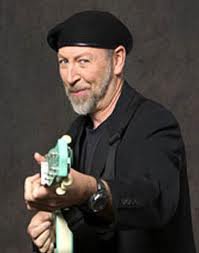
Richard Thompson should need no introduction. He has been an acclaimed songwriter/guitarist for over 40 years dating back to his innovative work with the pioneering English folk-rock group Fairport Convention.
There were albums with his wife (the ex) Linda – some of which appear in many critics favourite-ever lists -- then a solo career stretching to well over 20 albums under his own name, collaborations with avant-garde figures like David Thomas of Pere Ubu and the almost-supergroup Golden Palominos, tours as a solo artist or with his bands, soundtracks . . .
His most recent album is Electric (recorded with Buddy Miller in Nashville) which he describes as “a less powerful power trio, a wimp trio”, but because he has lived in both the US and the UK for so long, this Elsewhere interview – punctuated by Thompson's wry wit and laughter – starts with his previous album Dream Attic, a Best of Elsewhere album in 2010 . . .
I thought Dream Attic was a courageous idea, to try out new material live on an American audience and then put out the album with no overdubs or titivating up. I'm curious to know your relationship with American audiences as a man whose music is often grounded in English folk traditions and styles.
I think they mostly get it. Because I use a lot of British melodic references in what I do – and thematically because most of my songs are about Britain, those that aren't universal – it's a bit of leap for them to get it first time but I've developed a very loyal audience in America.
I'm slowly chipping away and I think they almost understand me now. Audiences are not that dissimilar as you travel, the Americans are a generous audience though.
They want you to succeed because Americans like to go out as a group and have fun as part of a pleasant experience, as opposed to some audiences in the UK who would be just as happy to see you fail. They get a kick out of that, it gives them some perverse pleasure.
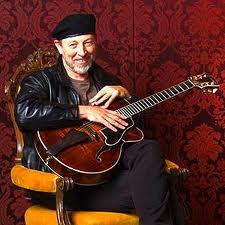 If we could speak in broad terms about
the critical reception you get, do you see a difference between how
Americans perceive you as opposed to the British press.
If we could speak in broad terms about
the critical reception you get, do you see a difference between how
Americans perceive you as opposed to the British press.
The British press have better points of reference, they actually do understand the music is not blues whereas the Americans might describe it as 'bluesy riffs', 'European style' or that 'magical-like quality'. They'll use words and think they are referring to something which they don't quite get, but usually they are wrong.
I get nice reviews in America on the whole but sometimes it's a bit skewed towards Ye Olde World England and they try to express that, which would be like going to America and saying, 'Hey there Tex, how are your six-guns?' They deal in cliches.
In Britain because of that longer connection it seems to me the first thing they are going to do is bring up Fairport Convention, the long career, the grand old man status etc – all of which are complements, but wouldn't you prefer they just take the new album for what it is rather than recontextualise it into a long history?
Yes, it's hard to get people to do that unfortunately. I know if it's the first album they had ever heard they would review it completely differently. But because you have a history critics say 'you are consistent artist and you never make a bad record'. But that's a curse because you tend to get reviewed the same way every time. It's hard to get anybody to say anything new, which is actually the least of my problems.
This despite the fact you seem to be constantly doing something new?
Yes I'm trying to and with the digital age you have to change it up as much as possible because things travel so fast. You can play a concert in one country and people in another quickly know all the songs you've played, so it's hard to surprise people anymore. So I have to keep on thinking of different projects or ways to package and present what I do and offer different angles.
You've sold this album Electric (reviewed here) on the basis of the 'less powerful power trio', so you quite consciously thought you wanted to write for the guys you tour with and keep it small and tight, but push to the edge of the trio concept like Cream and Hendrix, even though it sounds nothing like that.
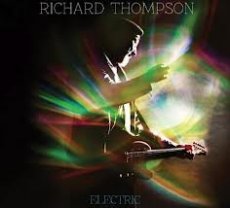 Yes, the trio is a smaller band I use
for some festivals and local gigs in California where I live. We all
live in Los Angeles so it's easy to get on a plane and play a
festival, but to get the five-piece together involves a lot of
logistics and airfares and it's too expensive unless it's a major
tour.
Yes, the trio is a smaller band I use
for some festivals and local gigs in California where I live. We all
live in Los Angeles so it's easy to get on a plane and play a
festival, but to get the five-piece together involves a lot of
logistics and airfares and it's too expensive unless it's a major
tour.
But for commando raid gigs the trio is the one. Then I thought we don't really have material for the trio, we just adapt other songs. So I thought I would start writing for them and see what happens.
I found that an inspiring idea and wrote a lot of songs, and then though that could be the next album.
I spoke to Bonnie Raitt the other day who made an interesting point: she said most people go in and record an album that they can then go out and tour, but she recorded an album just so she'd have new songs to play on stage for her audience. It's a subtle but important difference I think. I imagine you are like that, you want to be playing new things.
Yes, but the thing about an album is it's a focus for you to write for. If you know that you have a deadline or a structure, that's much easier than to come up with a trickle of songs. It's a good boost to prompt you to get new material.
Do you quite like that project idea, because I know you've done soundtracks and clearly focused things.
I think I like it more and more and I enjoy having a clear structure to the process.
And Buddy Miller? Where did you first meet.
Hmmm. Some years ago now when he and Julie were playing I think. I do a singer-songwriter cruise out of Miami and I've done it the last three years with Buddy, on the same boat but not playing with him. We jam together occasionally and I thought he'd be a good person to work with because I like some of the work he's done as a producer, and he records at home which is more fun.
I've seen that clip where you are sitting in the room he records in and it looked very relaxed. I imagine you've seen the inside of far too many big or horrible studios that his studio looked like a much nicer place to be.
Yes, sometimes the studio can be a sterile environment and you have to get past that and imagine an audience or that you are somewhere else. But in a house you can imagine you are just sitting around with friends and playing.
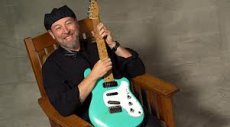 There are songs on the album which I'd
like to ask about specifically. I asked before about American
audiences as opposed to English. It strikes me that something as
gritty as Stuck on the Treadmill is going to better understood by
people who grew up with Coronation Street or kitchen-sink drama. Do
Americans get that in the same way as an English audience?
There are songs on the album which I'd
like to ask about specifically. I asked before about American
audiences as opposed to English. It strikes me that something as
gritty as Stuck on the Treadmill is going to better understood by
people who grew up with Coronation Street or kitchen-sink drama. Do
Americans get that in the same way as an English audience?
I hope so! There is a cable channel here which carries Coronation Street so that might help. I think it gets close enough to a Bruce Springsteen song about the working man that people will get it and the message is clear.
Yes, the message is clear but without being idiomatic it struck me as being a peculiarly English view of the world, an innate pessimism perhaps?
Yeah that's true. I think Americans as nation are more likely to pick up sticks and move somewhere else if there's no work, they will travel, move 2000 miles to get a job. Whereas as in Britain people will say 'I'm out of work and I'm aways going to be out of work' and just give up.
I said before I like the tough stuff on the album but it is the quieter songs like Another Small Thing in Her Favour which really appeal to me. Where does a song like that come from for you? I guess as we get older we accumulate more life experiences and also vicariously. You put yourself into the head of that character?
Yes. That's what I'm doing, I'm writing fiction. I start with a line an see where it takes me and sometimes it's surprising. If you have enough life experiences you can speak with an authentic voice. That's a parting song with a twist, she's leaving and she's got the kids as well and he still loves her and makes excuses for her behaviour, it's a very sad song.
Which are the feelings people go through. The big bombastic emotions we hear in songs are rare in real life. I like Saving the Good Stuff For You also, a man almost at rest with himself after all those years of tribulation and deliberate hurt. Do you have a notepad, or a legal pad like Leonard Cohen, which you constantly write on?
Absolutely. I jot stuff down. You are sitting on the bus and hear what someone says and you think it interesting to you jot it down.
You mentioned before that songwriting cruise and I note you have this Frets and Refrains songwriting thing in the Catskills, you are very generous in term of passing idea on. Have you always been like that, does it come from the folk tradition of swapping songs?
I don't think it's a folk thing. I do it because it's fun but have only done it this way in the past couple of years. I've done the odd electronic thing such as instructional tapes but personal teaching is a recent thing. But it's really rewarding and a lovely experience. This year in June we have Shawn Colvin teaching songwriting, Teddy my son, Michael Simpson, Happy Traum . . . Everybody last year had such a wonderful time.
You take all comers as well, regardless of experience.
Yes, it's incredibly brave of us! People come who aren't musicians just to hang out and soak up the atmosphere. Communicating ideas is rewarding, it isn't so much telling someone 'put your fingers here' as opposed to communicating a musical philosophy and an attitude that would inspire people to go away and feel enriched.
Is part of that an openness to possibility?
That's a very big part of it, to open people up and to think differently about guitar playing and seeing a much broader horizon of possibilities in playing. And in songwriting with ways to unlock yourself and be open to the creative possibilities around you.
Very briefly then, how do people make themselves more open to the possibilities. Can you give me the secret?
Oh no, you have to pay! But just briefly it is being alert to possibilities and looking on songwriting as 24 hour a day occupation. You might dream of an idea and you figure out a way to wake yourself up and right it down. You walk along the street or you are at work, all these places are potential sources of inspiration, but most of the time we are asleep to that.
There's that attitude of 'I'm going to go into my songwriting phase now and write until 10 o'clock' and that never works. But if you alert to ideas all through the day then when you have your writing periods you have ideas to build on.
People like John Hiatt and Nick Cave have told me, “Yeah, I get up and have my coffee, put on my jacket and go to my office at 8 and start writing'. Some do see it as a discipline, the old Brill Building philosophy.
Absolutely and I do the same thing. I start at 7 and not 8, so that's one hour better than John Hiatt.
I'm sure John Hiatt would also say he's aware of the world around him all the time, so it's not just office hours.
Bonnie Raitt said she had that year off after her parents and brother died and I asked if she did all those things we pretend we would do if we just had time, and she said no but had promised she'd get guitar lessons for the first time in her life. Bonnie Raitt getting guitar lessons?
Yeah, who's going to teach her!
Did you ever have serious lessons?
I took classical lessons when I was about 12 but just for a year and that was really useful. I think I take lessons all the time because I'm looking at a YouTube video of Barney Kessel or someone, and I try to learn from records and I'm reading transcriptions. So it never ends.
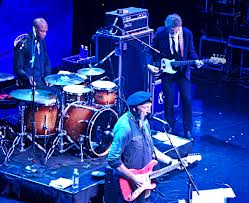 You practice every day?
You practice every day?
When I can, absolutely. There are times when I spend all day on a plane of course and sometimes if I'm on tour and have played six days straight, if there's a day off I won't just to give my fingers a chance to heal.
Is playing the Electric stuff physically harder?
No it's easier. Electric guitar is much easier because the strings are lighter. It is much harder and physical to do a solo show where it's just me for two hours, that is much more demanding. If it's a band show I can step back occasionally.
How far is your dance card booked up?
We are talking about trying to get to Australia and New Zealand at the end of this year or early next year. It was about 15 years ago the last I was there. It's been difficult the last few years because of the economy and I've been fairly determined to bring a band down for the first time.
I hope promoters are throwing vast amounts of money at you then.
Oh yes, I hope so too.
There are other Richard Thompson album reviews and an archival interview at Elsewhere starting here.

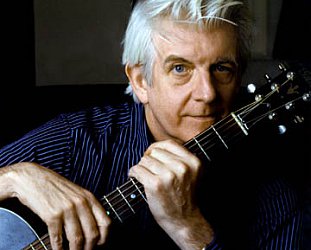
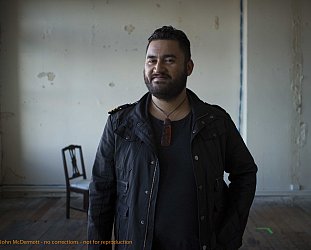

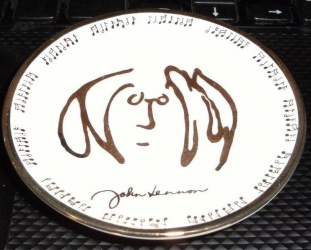


post a comment